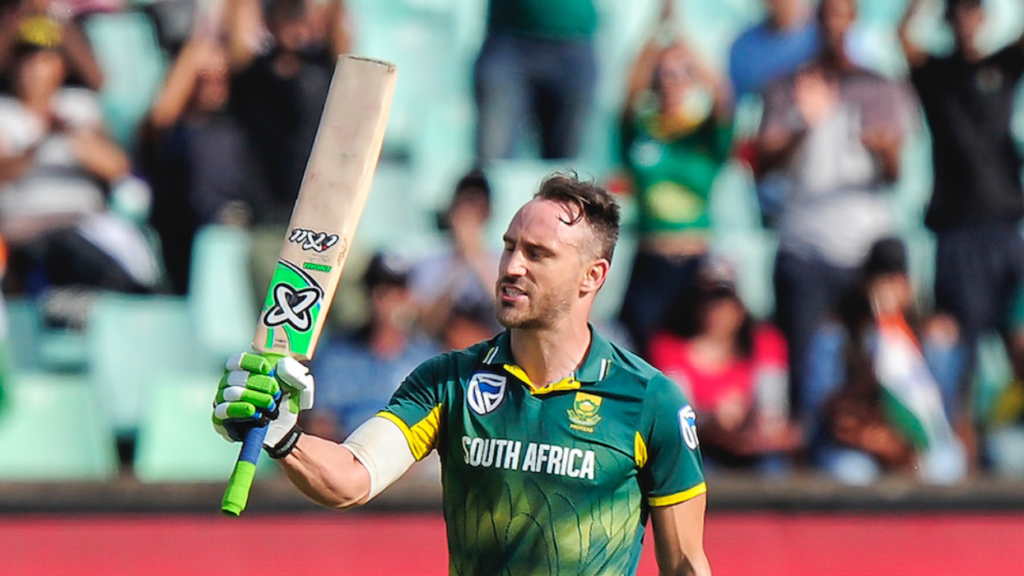Just like Herschelle Gibbs was awarded citizenship of St Kitts and Nevis for his 2007 World Cup heroics, Faf du Plessis could be given the freedom of Chennai following his hundred against Australia which had significant consequences for India, writes GARY LEMKE.
In 2007 Gibbs smashed six sixes off an over against the Netherlands and as such was awarded citizenship of the island nation in the Caribbean. However, Du Plessis’ 100 off 94 balls at Old Trafford will have had a billion Indians singing his praises.
For the South African captain went on to also receive the man-of-the-match reward as the Proteas clung on to beat the fancied Aussies by 10 runs and, in so doing, handed India a semi-final against New Zealand, whereas they would have taken on England had Australia done what was expected of them. No question that the Kiwis are being seen as the easier option to a place in the final.
So, finally, belatedly, South Africa left the best for last, batting first and reaching their highest score of the tournament, 325 for 6 and then throwing themselves around in the field to take advantage of a panicky opposition and restrict them to 315.
Batting first and putting runs on the board and then applying scoreboard pressure have been a trend of this tournament and conditions in England have changed over recent weeks as summer and clear skies have allowed teams to go out there and play their shots early.
And, against Australia, all the planets were aligned in favour of South Africa, who head home as the ‘seventh-best’ team at the World Cup. They had three wins, five defeats and a no result, to leave them ahead of Bangladesh, West Indies and Afghanistan on the table after the round-robin stages.
Their victories came against Afghanistan, Sri Lanka and Australia, while the defeats were at the hands of England, Bangladesh, India, New Zealand and Pakistan. Frustratingly for their fans, the final two wins came when they had already been eliminated. The wins will do nothing to sway the view that mentally they didn’t perform when the pressure was on.
By default, South Africa found their best opening partnership in Quinton de Kock and Aiden Markram after Hashim Amla was ruled out of the game injured during the pre-match warm-up. The younger pair put on 79 in 69 balls to get South Africa off to a flyer and the run rate was always on the better side of six to the over, and stayed like that mainly because when De Kock departed for 52 off 51 balls, the team situation was 114-2 off 106 balls.
That allowed Rassie van der Dussen – one of South Africa’s handful of success stories in the tournament – to take his time settling in and he accelerated later before being caught on the boundary last ball of the innings trying to reach his hundred with a six.
At 5-1 and then effectively 20-2 when Usman Khawaja retired hurt and losing Steve Smith in the seventh over with the score 33-2 (effective for three), there could only be one winner. Australia then limped to 119-4, needing 197 runs off 25.1 overs and only the tail and a hamstrung Khawaja to come.
Had South Africa lost from that situation it would have been their first choke of the tournament, with the theory being that you can only choke if you lose from a position in which it seems improbable to do so, snatching defeat from the jaws of victory.
Thankfully it didn’t get to that, despite David Warner and Alex Carey putting on 108 runs in 90 balls for the fifth wicket, before Carey went to his highest ODI score of 85 off 68 balls.
South Africa, for once, shone in the field. De Kock was brilliant behind the stumps, his class and agility highlighted by a run-out of Marcus Stoinis and an acrobatic leap skywards to remove Glenn Maxwell.
Afterwards, Du Plessis wore the widest of smiles and there was plenty of embracing and swapping of pleasantries with Imran Tahir who was playing his last ODI match – as was JP Duminy. Even Kagiso Rabada left his best for last, bowling with venom for the first time in the competition and pulling his yorker out of the bag as well.
But, it was all in vain and felt like a couple of ‘one for the roads’ after all the guests had left the party. Now, the big clean-up begins once the squad returns home.







